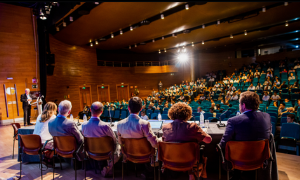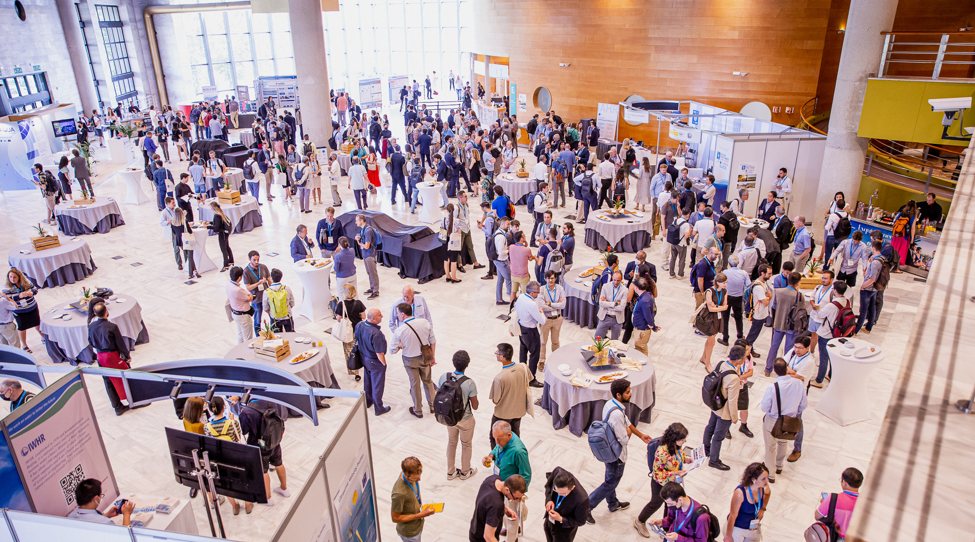Granada Outcome Statement | Hydro-Environment Knowledge for Solutions - From Snow to Sea
The 39th IAHR World Congress, bringing together 1200 experts, engineers and scientists from more than 70 nations around the world, addressed the theme “From Snow to Sea”. Convened by the International Association for Hydro-Environment Engineering and Research (IAHR) and the University of Granada, the Congress focused attention on the importance of considering the integral water cycle to address present and future challenges including:
 Human-water relationships; Snow, river and sediment management; Environmental hydraulics and urban water cycle; Hydraulic structures; Water-resource management, valuing and resilience; Computational and experimental methods; Coasts, estuaries and marine shelves; Extreme events (notably, droughts and floods); Ecohydraulics; and the Digitalisation of water management.
Human-water relationships; Snow, river and sediment management; Environmental hydraulics and urban water cycle; Hydraulic structures; Water-resource management, valuing and resilience; Computational and experimental methods; Coasts, estuaries and marine shelves; Extreme events (notably, droughts and floods); Ecohydraulics; and the Digitalisation of water management.
To address these challenges the IAHR Congress provided a platform for exchanges of the latest advances and experiences in water science and engineering, and innovation practices over 98 regular sessions, 143 poster presentations, 15 special sessions, 4 side events, 8 Technical Visits, 3 Workshops, 2 Master Classes, and Young Professional Network session. A series of ground-breaking “water monographs” was launched related to coastal protection, urban flood control, and water resources management. The activities reflect the vibrant meeting of the minds of world leading experts in the water and environment engineering field.
The global hydro-environment engineering and research community highlights the need to accelerate the discovery of knowledge and implementation of solutions to achieve the United Nation’s Sustainable Development Goals (SDGs). On the road to the 2023 UN Conference on Water and recognising the 2022 UN Conference on Oceans, the Congress, including its four High-Level Panels, delivered key messages on:
Snow to Sea
Research, engineering, management and legislative activities should operate in relevant, co-ordinated ways to develop operational snow-to-sea management approaches.
Governance institutions responsible for regulating and managing inland water resources, coastal areas and marine environments should develop systematic ways to share data and information.
Integrated freshwater and ocean monitoring systems can support coordinated implementa-tion of SDGs 6 and 14.
Coastal, fluvial and hydrological research communities must work closely together on model-ling, field measurements and assessment to facilitate integrated actions and research on path-ways across river basins.
Water Governance
Sound water management cannot be achieved without robust governance that should be based on strong regulatory frameworks, improved institutional capacity, transparency and ac-tive public participation.
Improving governance needs a holistic approach that considers the hydrological cycle as a whole and that covers all levels of management and planning jurisdictions (river basin, inter-national, national, regional, or multilateral territorial).
Governance should pave the way to facilitate the best available technical and scientific knowledge for decision making.
Artificial Intelligence
Artificial Intelligence (AI), and various forms of digitalisation, will help to transform the water and environment industry, and help to mitigate risks to realising a water secure world.
The human dimension of technology transition will catalyse positive change for AI in the water sector - in particular create added value to traditional industries and economies
The rapid growth in AI will help provide the backbone to achieve SDG goals, and create job opportunities across sectors, including the next generation of hydro-environmental engi-neers.
Nature Based Solutions
Nature Based Solutions (NBS) form an important line of methods augmenting traditional so-lutions to tackle a range of water-management challenges.
Integrated systems understanding is essential – selection of the most optimal measures in a local context after incorporating physical, socio-economic and ecological points of view.
Successful implementation of NBS requires working across disciplines, exchanging ideas and co-operating between different sectors (academia, governments, NGOs, civil society, financial institutions and industry).

The IAHR Congress recognises the critical role of capacity development in nations to accelerate the realisation of the SDG 6. Global and regional platforms and mechanisms, at all levels across government, academic, private sector and community are required. Sustained and ongoing investment in actions, resources and projects are required to accelerate the technical exchange, training and further education, knowledge transfer and the building of lasting networks.
Water is at the centre of major global challenges including climate change, demographic growth, food and energy security and safeguarding ecosystems. This centrality is particularly evident in regions vulnerable to water scarcity and extreme events, and where significant needs exist to increase resilience (e.g., parts of Africa). Advances in the science and engineering of water-flow processes and infrastructure are essential for realising a water secure future for all.